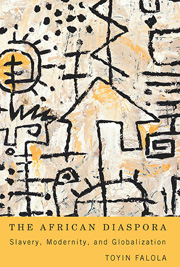Book contents
- Frontmatter
- Dedication
- Contents
- Preface and Acknowledgments
- Introduction: The Old and New African Diaspora
- Part 1 The Old Diaspora: Slavery and Identity Politics
- Part 2 An African Case Study: Yoruba Ethnicity in the Diaspora
- Part 3 The New Diaspora: Transnationalism and Globalization
- 8 Western Education and Transatlantic Connections
- 9 Africa in the Diaspora and the Diaspora in Africa: Toward an Integrated Body of Knowledge
- 10 Tanure Ojaide and Akin Ogundiran: Knowledge Circulation and the Diasporic Interface
- 11 Nollywood and the Creative World of Aderonke Adesola Adesanya: The African Impact on Global Cultures
- 12 Globalization and Contemporary Cultures
- Postscript: United States Foreign Policy on Africa in the Twenty-First Century
- Notes
- Bibliography
- Index
11 - Nollywood and the Creative World of Aderonke Adesola Adesanya: The African Impact on Global Cultures
from Part 3 - The New Diaspora: Transnationalism and Globalization
Published online by Cambridge University Press: 05 September 2013
- Frontmatter
- Dedication
- Contents
- Preface and Acknowledgments
- Introduction: The Old and New African Diaspora
- Part 1 The Old Diaspora: Slavery and Identity Politics
- Part 2 An African Case Study: Yoruba Ethnicity in the Diaspora
- Part 3 The New Diaspora: Transnationalism and Globalization
- 8 Western Education and Transatlantic Connections
- 9 Africa in the Diaspora and the Diaspora in Africa: Toward an Integrated Body of Knowledge
- 10 Tanure Ojaide and Akin Ogundiran: Knowledge Circulation and the Diasporic Interface
- 11 Nollywood and the Creative World of Aderonke Adesola Adesanya: The African Impact on Global Cultures
- 12 Globalization and Contemporary Cultures
- Postscript: United States Foreign Policy on Africa in the Twenty-First Century
- Notes
- Bibliography
- Index
Summary
This chapter focuses on two key examples of the manifestation of African culture in the African diaspora: the rapid spread of Nollywood movies to other parts of the world and the work of a new generation of transnationalist diaspora artists based both in Africa and throughout the Western world. These two examples and other topics related to culture and cultural production, such as identity, religion, art, and poetry, illustrate how various aspects of African culture are spreading to other parts of the world.
Nollywood
Nollywood, now ranked as the third largest movie production industry in the world after Hollywood and Bollywood, is predominantly based in Nigeria, and it has become truly global. It has become arguably the most powerful contemporary form of spreading African worldviews, recuperating older values, propagating newer ones, and celebrating multivalent stories. Nollywood films have traveled widely and combine an adept manipulation of African languages with images and scenes that reveal African landscapes and storylines that are grounded in the rich valences of African culture. One can purchase the films in stores in European and American cities as well as across Africa. Given the large number of films and topics, I will draw examples from the Yoruba productions to avoid excessive generalizations.
- Type
- Chapter
- Information
- The African DiasporaSlavery, Modernity, and Globalization, pp. 282 - 312Publisher: Boydell & BrewerPrint publication year: 2013



